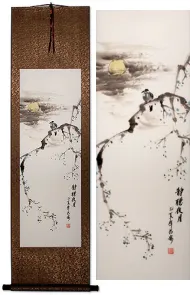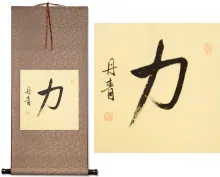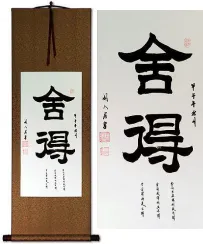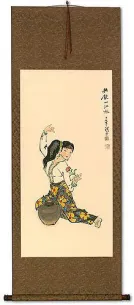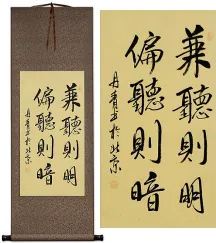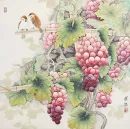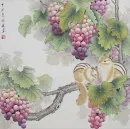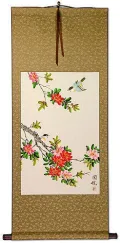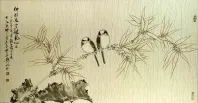Many custom options...
And formats...

Strength to Carry On in Chinese / Japanese...
Buy a Strength to Carry On calligraphy wall scroll here!
Personalize your custom “Strength to Carry On” project by clicking the button next to your favorite “Strength to Carry On” title below...
Carry On, Undaunted
前赴後繼 is a Chinese proverb that figuratively means “to advance dauntlessly in wave upon wave.”
It suggests that you should or can carry on and have the strength to keep going.
While this proverb is a little bit militaristic, it suggests that despite a fallen comrade (or perhaps a loved one), you should keep going and work towards the goal they intended.
Undaunted After Repeated Setbacks
Persistence to overcome all challenges
百折不撓 is a Chinese proverb that means “Be undaunted in the face of repeated setbacks.”
More directly translated, it reads, “[Overcome] a hundred setbacks, without flinching.” 百折不撓 is of Chinese origin but is commonly used in Japanese and somewhat in Korean (same characters, different pronunciation).
This proverb comes from a long, and occasionally tragic story of a man that lived sometime around 25-220 AD. His name was Qiao Xuan, and he never stooped to flattery but remained an upright person at all times. He fought to expose the corruption of higher-level government officials at great risk to himself.
Then when he was at a higher level in the Imperial Court, bandits were regularly capturing hostages and demanding ransoms. But when his own son was captured, he was so focused on his duty to the Emperor and the common good that he sent a platoon of soldiers to raid the bandits' hideout, and stop them once and for all even at the risk of his own son's life. While all of the bandits were arrested in the raid, they killed Qiao Xuan's son at first sight of the raiding soldiers.
Near the end of his career, a new Emperor came to power, and Qiao Xuan reported to him that one of his ministers was bullying the people and extorting money from them. The new Emperor refused to listen to Qiao Xuan and even promoted the corrupt Minister. Qiao Xuan was so disgusted that in protest, he resigned from his post as minister (something almost never done) and left for his home village.
His tombstone reads “Bai Zhe Bu Nao” which is now a proverb used in Chinese culture to describe a person of strong will who puts up stubborn resistance against great odds.
My Chinese-English dictionary defines these 4 characters as “keep on fighting despite all setbacks,” “be undaunted by repeated setbacks,” and “be indomitable.”
Our translator says it can mean “never give up” in modern Chinese.
Although the first two characters are translated correctly as “repeated setbacks,” the literal meaning is “100 setbacks” or “a rope that breaks 100 times.” The last two characters can mean “do not yield” or “do not give up.”
Most Chinese, Japanese, and Korean people will not take this absolutely literal meaning but will instead understand it as the title suggests above. If you want a single big word definition, it would be indefatigability, indomitableness, persistence, or unyielding.
See Also: Tenacity | Fortitude | Strength | Perseverance | Persistence
This in-stock artwork might be what you are looking for, and ships right away...
Gallery Price: $108.00
Your Price: $59.88
Gallery Price: $65.00
Your Price: $39.77
Gallery Price: $200.00
Your Price: $69.88
Gallery Price: $61.00
Your Price: $33.88
Gallery Price: $61.00
Your Price: $33.88
Gallery Price: $61.00
Your Price: $33.88
Gallery Price: $61.00
Your Price: $33.88
Gallery Price: $240.00
Your Price: $98.88
Gallery Price: $100.00
Your Price: $59.88
Not the results for strength to carry on that you were looking for?
Below are some entries from our dictionary that may match your strength to carry on search...
| Characters If shown, 2nd row is Simp. Chinese |
Pronunciation Romanization |
Simple Dictionary Definition |
佗 see styles |
tuó tuo2 t`o to ta わび |
carry on the back (irregular kanji usage) the beauty to be found in poverty and simplicity; subdued taste; quiet refinement; sober refinement; wabi He, she, it; other; i.e. 他; translit. tha, e.g. in sthāna , sthāman. |
孭 see styles |
miē mie1 mieh |
to carry on the back or shoulders (Cantonese) |
托 see styles |
tuō tuo1 t`o to taku |
to hold up in one's hand; to support with one's palm; something serving as a support: a prop, a rest (e.g. arm rest); (bound form) a shill; to ask; to beg; to entrust (variant of 託|托[tuo1]); torr (unit of pressure) To carry on the palm, entrust to. |
扛 see styles |
káng kang2 k`ang kang |
to carry on one's shoulder; (fig.) to take on (a burden, duty etc) |
拓 see styles |
tuò tuo4 t`o to hiromu ひろむ |
to expand; to push something with the hand; to develop; to open up (female given name) Hiromu Carry (on the palm), entrust to, pretext, extend. |
挽 see styles |
wǎn wan3 wan hiki ひき |
to pull; to draw (a cart or a bow); to roll up; to coil; to carry on the arm; to lament the dead; (fig.) to pull against; to recover (surname) Hiki |
掮 see styles |
qián qian2 ch`ien chien |
to carry on the shoulder |
擓 㧟 see styles |
kuǎi kuai3 k`uai kuai |
(dialect) to scratch (an itch); to carry on the arm; to scoop up; Taiwan pr. [kuai1] |
沿 see styles |
yán yan2 yen |
along; to follow (a line, tradition etc); to carry on; to trim (a border with braid, tape etc); border; edge |
紹 绍 see styles |
shào shao4 shao mitsugu みつぐ |
to continue; to carry on (female given name) Mitsugu To continue, hand down. |
荷 see styles |
hè he4 ho ni に |
to carry on one's shoulder or back; burden; responsibility (1) load; baggage; cargo; freight; goods; (2) burden; responsibility; (personal name) Hasu A small-leaved water-lily, a marshmallow; to carry bear. |
負 负 see styles |
fù fu4 fu fu ふ |
to bear; to carry (on one's back); to turn one's back on; to be defeated; negative (math. etc) (noun - becomes adjective with の) (See 正・せい・4) negative; minus To bear on the back; turn the back on; Iose. |
賡 赓 see styles |
gēng geng1 keng |
(literary) to continue; to carry on |
頂 顶 see styles |
dǐng ding3 ting tei / te てい |
apex; crown of the head; top; roof; most; to carry on the head; to push to the top; to go against; to replace; to substitute; to be subjected to (an aerial bombing, hailstorm etc); (slang) to "bump" a forum thread to raise its profile; classifier for headwear, hats, veils etc (1) crown (of head); summit (of mountain); spire; (2) easy win for one; (3) something received; (personal name) Tei Top of the head, crown, summit, apex, zenith; highest; to rise; oppose; an official's 'button'. |
馱 驮 see styles |
tuó tuo2 t`o to da |
to carry on one's back 駄 Translit. dha, dhya. |
㧯 see styles |
lǎo lao3 lao |
round-bottomed wicker basket; (dialect) to lift; to carry on one's shoulder |
不誤 不误 see styles |
bù wù bu4 wu4 pu wu |
used in expressions of the form 照V不誤|照V不误[zhao4 xx5 bu4 wu4], in which V is a verb, 照[zhao4] means "as before", and the overall meaning is "carry on (doing something) regardless" or "continue (to do something) in spite of changed circumstances", e.g. 照買不誤|照买不误[zhao4 mai3 bu4 wu4], to keep on buying (a product) regardless (of price hikes) |
偷情 see styles |
tōu qíng tou1 qing2 t`ou ch`ing tou ching |
to carry on a clandestine love affair |
因循 see styles |
yīn xún yin1 xun2 yin hsün injun いんじゅん |
to continue the same old routine; to carry on just as before; to procrastinate (noun or adjectival noun) indecision; vacillation |
守成 see styles |
shǒu chéng shou3 cheng2 shou ch`eng shou cheng shusei / shuse しゅせい |
to preserve the accomplishments of previous generations; to carry on the good work of one's predecessors (noun, transitive verb) building up and maintaining; (personal name) Morinari |
守業 守业 see styles |
shǒu yè shou3 ye4 shou yeh |
to preserve one's heritage; to defend the accomplishments of previous generations; to carry on the good work; to keep one's business going |
承接 see styles |
chéng jiē cheng2 jie1 ch`eng chieh cheng chieh |
to receive; to accept; to carry on |
承續 承续 see styles |
chéng xù cheng2 xu4 ch`eng hsü cheng hsü shōzoku |
to carry on |
抬槓 抬杠 see styles |
tái gàng tai2 gang4 t`ai kang tai kang |
to bicker; to argue for the sake of arguing; to carry on poles (together with sb else); to carry a coffin on poles |
担う see styles |
ninau になう |
(transitive verb) (1) to carry on shoulder; to shoulder (gun); (2) to bear (burden, responsibility, etc.) |
担ぐ see styles |
katsugu かつぐ |
(transitive verb) (1) to shoulder; to carry on one's shoulder; (transitive verb) (2) to nominate for a position; to choose as a representative; (transitive verb) (3) to take (someone) for a ride; to deceive; to take in; (transitive verb) (4) to be caught up in superstition |
挾帶 挟带 see styles |
xié dài xie2 dai4 hsieh tai |
to carry along; to carry on one's person; to carry secretly |
接著 接着 see styles |
jiē zhe jie1 zhe5 chieh che |
to catch and hold on; to continue; to go on to do something; to follow; to carry on; then; after that; subsequently; to proceed; to ensue; in turn; in one's turn See: 接着 |
攜帶 携带 see styles |
xié dài xie2 dai4 hsieh tai |
to carry (on one's person); to support (old); Taiwan pr. [xi1 dai4] |
沿襲 沿袭 see styles |
yán xí yan2 xi2 yen hsi |
to carry on as before; to follow (an old custom etc) |
Click here for more strength to carry on results from our dictionary
The following table may be helpful for those studying Chinese or Japanese...
| Title | Characters | Romaji (Romanized Japanese) | Various forms of Romanized Chinese | |
| Carry On, Undaunted | 前赴後繼 前赴后继 | qián fù hòu jì qian2 fu4 hou4 ji4 qian fu hou ji qianfuhouji | ch`ien fu hou chi chienfuhouchi chien fu hou chi |
|
| Undaunted After Repeated Setbacks | 百折不撓 百折不挠 | hyaku setsu su tou hyakusetsusutou hyaku setsu su to | bǎi zhé bù náo bai3 zhe2 bu4 nao2 bai zhe bu nao baizhebunao | pai che pu nao paichepunao |
| In some entries above you will see that characters have different versions above and below a line. In these cases, the characters above the line are Traditional Chinese, while the ones below are Simplified Chinese. | ||||
Successful Chinese Character and Japanese Kanji calligraphy searches within the last few hours...


